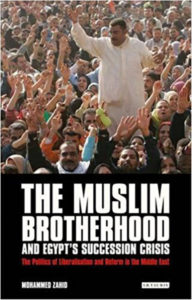
The Muslim Brotherhood and Egypt’s Succession Crisis: The Politics of Liberalisation and Reform in the Middle East
Mohammed Zahid
I.B.Tauris (2012), Rs8,440
The tense relationship between the Muslim Brotherhood and the Egyptian state has been central to political developments for many decades, a source of continuous conflict and discord. In the wake of Egypt’s historic uprising in early 2011, the Brotherhood continue to loom large on the horizon of Egyptian political and social landscapes, making Mohammed Zahid’s insight into the troubled history of this organization essential reading.
He delves into the complexities of Egyptian politics and jostling for power in recent years, amid increasing pressures for reform. In doing so, Zahid sheds light on the challenges of authoritarianism and democratization facing Egypt and the region as a whole.
The Muslim Brotherhood and Egypt’s Succession Crisis tantalizes readers by invoking two of the most popular topics about contemporary Egypt. New information on the Brotherhood or the twilight of Hosni Mubarak’s reign is sure to entice scholars and policy makers.
Zahid provides an excellent overview by revisiting many of the topics scholars have struggled with for the past two decades. For example, in Chapter Two alone, the author guides readers on a tour that weighs causal mechanisms between economic and political reform, culture and democracy, authoritarianism and democracy, the character of civil society, US foreign policy and its democratizing propensity, and the complex relationship of the military-state-business power elites and persistent autocracy.
Mohammed Zahid completed his PhD in Middle Eastern Political Economy and Politics at the University of Leeds. He has published widely in international journals and consulted for a number of agencies and think tanks on a variety of Middle Eastern issues.
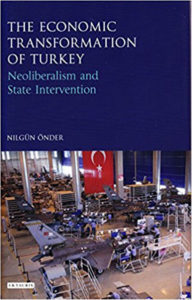
The Economic Transformation of Turkey: Neoliberalism and State Intervention
Nilgün Önder
I.B. Tauris (2015), Rs11,145
The coup d’état which took place in Turkey on 12 September 1980 was the third in the history of the Republic, and ushered in a three-year period of military rule. Nilgün Önder investigates the economic transformation of Turkey after this coup, examining both the policies enacted under the military regime and those during the subsequent period of civilian government. Önder argues the key aspect of economic policy was that of neoliberal restructuring, and integral to this was the exclusion of organised labour from the political process. In doing so, she highlights the irony of the era: that at an official level, there was an emphasis upon neoliberal economic values, such as limited state involvement. And yet at the same time, policies were enacted which were aimed at a more interventionist position when it came to industrial relations. It was through new legislation and bureaucratisation of the industrial relations system that the state transformed the Turkish economy, attempting to open it up to foreign investment and trade: in effect creating the foundations of Turkey’s current economic success.
Nilgün Önder is Assistant Professor in the Department of Political Science at the University of Regina, Canada. Previously Assistant Professor at Carleton University, Ottawa, she holds a PhD in Political Science from York University, Toronto.
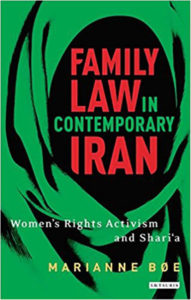
Family Law in Contemporary Iran: Women’s Rights Activism and Shari’a
Marianne Bøe
IB Tauris (2015), Rs11,309
Passed into law over a decade before the Revolution, the Family Protection Law quickly drew the ire of the conservative clergy and the Ayatollah Khomeini in 1979. In fact, it was one of the first laws to be rescinded following the revolution. The law was hardly a surprising target, however, since women’s status in Iran was then – and continues now to be – a central concern of Iranian political leaders, media commentators, and international observers alike. Taking up the issue of women’s status in a modern context, Marianne Bøe offers a nuanced view of how women’s rights activist assert their rights within an Islamic context by weaving together religious and historical texts and narratives. Through Her substantial fieldwork and novel analysis, Bøe undermines both the traditional view of ‘Islamic Feminism’ as monolithic and clears a path to a new understanding of the role of women’s rights activists in shaping and synthesizing debates on the shari’a, women’s rights and family law. As such, this book is essential for anyone studying family law and the role of women in contemporary Iran.
Marianne Bøe is Researcher in the Centre for Women’s and Gender Studies, University of Bergen, Norway, where she received her PhD. She has published widely on women’s issues and religion, as well as on multiculturalism and Islam in Europe.
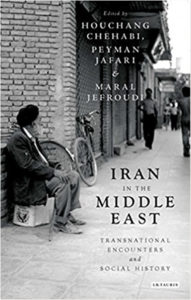
Iran in the Middle East: Transnational Encounters and Social History
Eds Houchang Chehabi, Peyman Jafari,
Maral Jefroudi
IB Tauris (2015), Rs11,309
Iran’s interaction with its neighbours is a topic of wide interest. But while many historical studies of the country concentrate purely on political events and high-profile actors, this book takes the opposite approach: writing history from below, it instead focuses on the role of everyday lives.
Modern Iranian historiography has been dominated by ideas of nationalism, modernization, religion, autocracy, revolution and war. Iran in the Middle East adds new dimensions to the study of four crucial areas of Iranian history: the events and impact of the Constitutional Revolution, Iran’s transnational connections, the social history of Iran and developments in historiography. Featuring eminent scholars such as Ali Ansari, Janet Afary and Erik-Jan Zürcher, this book makes a significant contribution to the understanding of Iran in a transnational context by exploring the key social actors in the constitutional revolution, trade and the role of women.
The authors emphasize the role of societal transformations, social movements, class, gender and ethnic identities, analyzing both national and individual identity. What emerges is a concise and unique look at Iranian social history, from both within the country’s internal relationships with its social groups, and from its external relations with neighbouring countries. It will prove essential reading to scholars and students of Iran and the wider Middle East region
‘This is a magnificent collection of articles on modern Iranian social and political history. Original and timely, it will be of great value to both the expert and the more general reader,’ writes Stephanie Cronin of the University of Oxford in his review.
Maral Jefroudi is a PhD Researcher at the International Institute for Social History, Amsterdam and Leiden University.
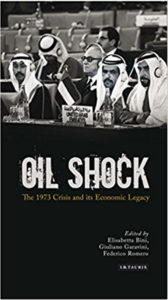
Oil Shock: The 1973 Crisis and Its Economic Legacy
Elisabetta Bini & Giuliano Garavini
I.B. Tauris (2016), Rs11,309
The ‘Oil Shock’ of 1973?the shift from the era of low-priced oil to the era of high-priced oil?was a turning point in the history of the 20th century. This book provides an analysis of the crisis and its global political and economic impact. It features contributions from a range of perspectives and approaches, including political, economic, environmental, international and social history. The authors examine the origins of the ‘oil revolution’ for oil-producing countries, as well as the far-reaching effects on oil and international energy markets, international relations and the global economy; and the long term effects on the Cold War, Soviet energy policies and decolonization. In doing so, they provide a detailed picture of one of a defining event of the last century, an event that set the framework for the changes that have led to the quite different energy scenario of today.
Reviews: ‘The legacies of the oil price increases of the 1970s have never quite stopped unfolding, and continue four decades later to affect us in diverse ways. Oil Shockoffers a timely and panoramic survey of the origins and consequences of 1973 at a time when oil, the politics of oil, and the Middle East are once again back in the headlines.’ (Gopalan Balachandran, Professor of International History and Politics, The Graduate Institute Geneva); “This superb collection of essays provides a comprehensive analysis of the 1973 Oil Crisis. Relying on a rich archival research and examining the multiple drivers, facets and reverberations of the crisis, the volume offers important information and insightful interpretations on a pivotal moment in the history of modern international relations. This is essential reading for anyone interested in the 1970s, the Cold War, and the origins of the current global energy regime.” (Mario Del Pero, Professor of International History, Science Po Paris); “This book provides an important and valuable contribution to the understanding of the oil shock in 1973 and its long lasting consequences.” (Einar Lie, Professor of Economic History, University of Oslo); “Fifty years down the line, the key factors that gave rise to the First Oil Shock (the Middle East in flames, the dearth of “easy oil”) are still with us, and yet this anniversary was passed over in near total silence in both the media and academia. This valuable book is the crystallization of the commendable effort on the part of a group of Italian academics to make sure that hard questions about the First Oil Shock continue to be asked.” (Juan Carlos Buoe, Research Fellow, Oxford Institute for Energy Studies.)
Elisabetta Bini is Research Fellow at the University of Rome. She was a Max Weber Postdoctoral Fellow at the European University Institute in Florence and holds a PhD in Modern History from New York University.
Giuliano Garavini is Research Fellow at the University of Padua and Senior Fellow at New York University Abu Dhabi. He is the author of After Empires: European Integration, Decolonization and the Challenge from the Global South, 1957-1986.

